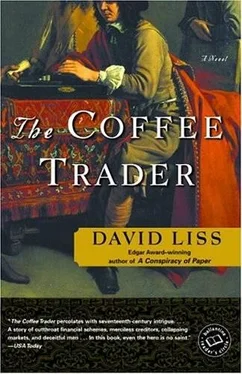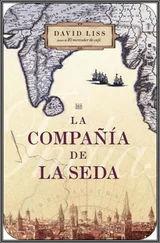For one thing, there is coffee.
Not so long ago, in the time of my boyhood, coffee was like any other exotic powder or dried berry you might find in an apothecary’s musty cabinet. It was given in small doses for diseases of the blood and bowels. Too much is poison, they would say. Even now, as this elixir spreads like a murky tide across Europe, the apothecaries cry out to drinkers to stay their hands. Great quantities of this medicine will make you weak, they say. It dries out the blood; it leads to impotence and infertility. Coffee leads to nothing of the sort, I promise you. I consume it in great quantities, and my blood is as robust as that of a man half my age.
It has always been looked on dubiously, this poor drink that only wants to improve us, to make us more than we are. It first became known among the men of the Orient, who were suspicious of its marvelous effects. Those of the Mohammedan faith shun alcohol, so they had no experience with drinks that change a man’s disposition. Over a hundred years ago, in the land of Egypt, the viceroy summoned the great imams to debate whether coffee was permitted or forbidden by the dietary code of their sacred teachings. Coffee is like wine, one imam declared, and is therefore forbidden. But who could agree or disagree, these all being righteous men who had never themselves tasted wine and could only guess. They knew wine makes a man sleepy, yet coffee makes him alert. Therefore coffee could not be like wine.
Another shouted that coffee is black, and the beans, when roasted, are like dirt. The eating of dirt was forbidden by Mohammed and therefore coffee is forbidden. But another argued that since fire purifies, the process of roasting the berries makes them not unclean but rather cleanses away that which was once unclean in them. In the end they could only say that coffee was neither forbidden nor permitted, but was mekruh, undesirable.
Of course, they were mistaken. Coffee is nothing if not desirable. All men desire its power, and when it first emerged there were those who desired the wealth it might bring. One such man, of course, was Miguel Lienzo, the benefactor of my youth. How good he had been to my family, providing us with warning about the Inquisition when no one else thought to save us! Did he do this for profit? No, there could be none. Did he act out of love? He barely knew us. He did it, I believe, because he is a righteous man and delights in thwarting the plans of evildoers.
I had no desire to make him uncomfortable, so when I formed a friendship with Lienzo in Amsterdam, I did not embarrass him by recollecting the kindness he had done my family. Instead, I did some small business with him, joined him at taverns and eateries, and studied with him at the Talmud Torah until the time of my exile.
When I saw him we talked of little of consequence. Then one day he informed me that he wanted to enter into the coffee trade. I knew about coffee from the years I had sojourned in the East. I knew that a man who drinks coffee is twice as strong, twice as wise, and twice as cunning as the man who abstains. I knew that coffee unlocks doors in the mind.
And I knew other things too. I knew things I was not quite prepared to tell my friend Senhor Lienzo. Not because I wanted him to fail, oh, no. Nothing of the sort. I held on to my secrets because I wanted him to succeed, and I had every reason to believe that this new coffee venture could be just the thing I needed.
Coffee. It was a fire that fed on itself.
Miguel sat in his cellar, his feet cold from canal water, as he drank bowl after bowl of coffee and wrote to brokers and traders on every exchange he knew. It would be weeks, of course, before he would get responses, but soon they would come. He urged quick replies. He promised generous commissions.
It was as Alferonda had said. He remained awake half the night, reading through his letters, tearing them up, and rewriting them. He studied the week’s Torah portion and knew he would dazzle his study group at the synagogue. He reread eight tales of Charming Pieter.
The next day he felt weary, but if that was the price of productivity he was willing to pay. In any case, morning coffee paid the debts incurred by the coffee of the previous night.
Miguel heard that Parido and his trading combination had lost a great deal-that is to say, they had not profited as handsomely as they had intended-because of Miguel’s interference in whale oil. When the two men saw each other on the Exchange, however, Parido showed no ill will.
“I hear your month ended well,” the parnass said. He might have been discussing the death of a friend for all the cheer in his voice.
Miguel smiled brightly. “It might have been better.”
“I could say the same for my own. Did you know your machinations in whale oil caused me to incur some unpleasant losses?”
“I’m terribly sorry to learn that,” Miguel said. “I had no idea you were involved, or I would never have ventured there myself.”
“So you tell me, but things appear somewhat dubious,” Parido said. “There are those who whisper in my ear to tell me your whale-oil scheme was a slap in the face.”
“I would not let my brother whisper in your ear if I were you. His breath would fell a horse. If you don’t have faith in my honesty, at least have faith in my caution. Why would I risk your displeasure by trading knowingly against your interests?”
“I cannot say what compels a man to act as he acts.”
“Nor can I. You know, brandy surged at the last moment. Some Dutch fellows bought a massive quantity and sent the price soaring. You had no knowledge of that, I suppose, though men might whisper a thing or two in my ear if I let them.”
Parido frowned. “You don’t think I would trick you out of your futures, do you?”
“Things appear somewhat dubious,” Miguel said.
Parido let out a sour little laugh. “Perhaps we are on an equal footing. You lost far less in brandy than I did in whale oil, but your losses are surely more significant to you than mine are to me.”
“Surely,” Miguel agreed.
“Let me ask you one thing, however. How is it that you just happened upon whale oil? It is an odd coincidence, don’t you think?”
Miguel could think of no answer, but Parido spoke again before the silence became too conspicuous.
“Did someone advise you to trade in whale oil?”
It was as though Charming Pieter whispered the name. Of course. Why not say so?
To implicate this man could not be counted as a betrayal, because the man was out of Parido’s grasp. “I did receive a note-unsolicited, of course-from that fellow Alferonda. He advised me to buy into whale oil.”
“And you believed him, this man we had cast out of the community?”
“I thought he had no reason to lie, and when I examined the commodity for myself and asked around the Exchange, I concluded that the advice had been good.”
Parido scratched at his beard thoughtfully. “I had supposed it might come to this. I would advise you to have no more dealings with him, Lienzo. Pay him a broker’s fee if you must, but be rid of him. The man is a danger to anyone he touches.”
Miguel could hardly believe his luck, having so easily escaped Parido’s anger. Certainly he seemed irritated that he had lost money, but he was too eager to blame Alferonda to waste his anger upon Miguel.
Meanwhile, he had begun to realize that obtaining his whale-oil profits might be more difficult than he thought. After reckoning day, when no money had been deposited into his account at the Exchange Bank and he began receiving letters from his Muscovy agent regarding his nineteen hundred guilders, Miguel thought it was time to hunt his money. He found Ricardo, the broker to whom he’d sold his shares, at a tavern popular with Portuguese Jews. He was already slightly drunk and looking like he wanted, more than anything else, to be in his own bed-or, at the very least, away from Miguel.
Читать дальше












